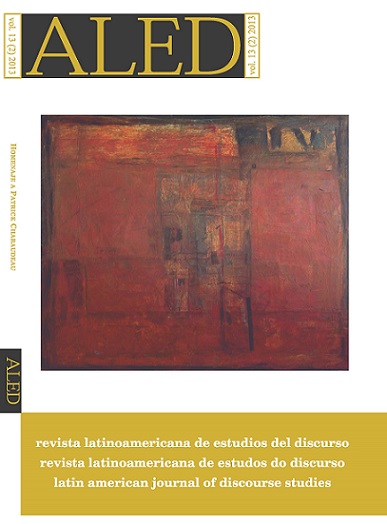Los géneros desde una perspectiva socio-enunciativa
La noción de contexto integrado
Keywords:
integrated context. socio-enunciative dynamics. discourse genre.Abstract
In this article, we extend the social enunciative dynamics model ”“hereafter SED”“ based on the Bakhtinian dialogic principle, a model that may facilitate the analysis of discourse (Martínez, 2001a, 2005, 2006, 2007). The theoretical insight comes from the notion of integrated context in the utterance (Bakhtin/Volochinov, 1977 [1926]), which highlights the social orientation of the utterance in the discourse genre. The explanation of this model is based on the distinction between situation of communication and situation of enunciation (Charaudeau, 1992, 2004) and proposes the inclusion of both types of situation within the utterance. The theory about codes, class and identity (Bernstein, 1994 [1974]) enables us to propose the SED model, by activating the search for an explanation of how social experience is transformed into symbolic experience, along with the notion of integrated context, and the inclusion of the situations mentioned above. Thus, the idea that the utterance, produced in discursive genre boundaries, is the mediating element of this transformation is reinforced.
Downloads
References
AUSTIN, J. L. (1982). Cómo hacer cosas con palabras. Barcelona: Paidós Ibérica.
BAJTIN, M. (1997 [1924]). Hacia una filosofía del acto ético. Puerto Rico: Anthropos.
BAJTÃN, M. (1993 [1929]). Problemas de la poética de Dostoievski. Bogotá: Fondo de Cultura Económica.
BAJTÃN, M. (1989 [1934]). Teoría y estética de la novela. Madrid: Taurus.
BAKHTINE, M. (1984 [1956]). Esthétique de la création verbale. Paris: Gallimard.
BAKHTINE, M. & VOLOCHINOV, V. (1981[1926]). Le discours dans la vie et dans la poésie, en T. Todorov, Mikhaïl Bakhtine, le principe dialogique, pp.181-215. Paris: Seuil.
BAKHTINE, M. & VOLOCHINOV, V. (1977 [1929]). Le marxisme et la philosophie du langage. Paris: Minuit.
BERNSTEIN, B. (1994 [1974]). La estructura del discurso pedagógico. Madrid: Morata.
CHARAUDEAU, P. (1983). Langage et discours. Paris: Hachette.
CHARAUDEAU, P. (1992). Grammaire du sens et de l’expression. Paris: Hachette.
CHARAUDEAU, P. (2003). El discurso de la información. Barcelona: Gedisa.
CHARAUDEAU, P. (2004). La problemática de los géneros. De la situación a la construcción textual. Revista Signos, 37(56):23-39. [Disponible en http://www.scielo.cl/scielo.php?script=sci_arttext&pid=S0718-09342004005600003&lng=en&nrm=iso&tlng=es]
CHARAUDEAU, P. (2012). Los géneros, una perspectiva socio-comunicativa, en M. Shiro, P. Charaudeau y L. Granato (eds.), Los géneros discursivos desde múltiples perspectivas. Teorías y análisis, pp. 19-44. Madrid: Vervuert Iberoamericana.
DUCROT, O. (1986). Polifonía y argumentación. Cali: Universidad del Valle.
MARTINEZ, M. C. (1991). Analyse du discours pédagogique des manuels scolaires de sciences en Colombie, la sémantique du social et la sémantique de la nature: un écodiscours. Tesis doctoral. Universidad Paris XIII.
MARTÃNEZ, M. C. (1994 [1985]). Análisis del discurso. Cohesión, coherencia y estructura semántica de los textos expositivos. Cali: Universidad del Valle.
MARTÃNEZ, M. C. (1997). El proceso discursivo de la significación, en M.C. Martínez (Comp.) Proceso, discurso y significación, estudios de análisis del discurso, pp.7-16.Cali: Universidad del Valle- Asociación latinoamericana de estudios del discurso-ALED Colombia.
MARTÃNEZ, M. C. (2001a). La dinámica enunciativa: la argumentación en la enunciación, en M.C. Martínez (Comp.). Aprendizaje de la argumentación razonada. Vol. 3, pp.11-28. Cali: Cátedra UNESCO Lectura y Escritura. Universidad del Valle.
MARTÃNEZ, M. C. (2001b). Análisis del discurso. Una propuesta para leer, escribir y aprender mejor. Buenos Aires: Homo Sapiens.
MARTÃNEZ, M. C. (2005). La construcción del proceso argumentativo en el discurso: Perspectivas teóricas y trabajos prácticas. Cali: Universidad del Valle.
MARTÃNEZ, M. C. (2006). Los géneros discursivos: Situación de comunicación y situación de enunciación, en M.C. Martínez, Curso virtual para el desarrollo de estrategias de comprensión y composición de textos. Módulos 1 y 2. Cali: DINTEV- Cátedra UNESCO Lectura y Escritura. Universidad del Valle, Campus Virtual, cursos de extensión. Colombia. [Disponible en www.univalle.edu.co].
MARTÃNEZ, M. C. (2007). La orientación social de la argumentación en el discurso. Una propuesta integrativa, en R. Marafioti (ed.), Parlamentos. Teoría de la argumentación y debate parlamentario, pp.197-222. Buenos Aires: Biblos.
SEARLE, J. R (1982). Sens et expression. Paris:Minuit.
Downloads
Published
How to Cite
Issue
Section
License

This work is licensed under a Creative Commons Attribution-NonCommercial-NoDerivatives 4.0 International License.
The authors retain the copyright and guarantee RALED the right to be the first publication of the work as well as a Creative Commons Attribution License that allows others to share the work with recognition of authorship and the initial publication in this journal.




